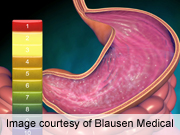
THURSDAY, Jan. 10 (HealthDay News) — Researchers have developed a scoring system to help doctors determine which hospital patients can be prescribed stomach acid-suppressing drugs to prevent gastrointestinal bleeding and which patients should not be given such medications.
Gastrointestinal bleeding in hospital patients is rare, but it is dangerous and potentially fatal, according to the study authors.
Although the use of acid suppressants to prevent gastrointestinal bleeding in patients who are not critically ill is not widely recommended, the medications are commonly used for this purpose, said Shoshana Herzig and colleagues at the Beth Israel Deaconess Medical Center in Boston.
The study was published online recently in the Journal of General Internal Medicine.
The researchers analyzed data from more than 75,000 hospital patients admitted over three years and found that gastrointestinal bleeding occurred in about 200 of them, according to a journal news release.
Independent risk factors for gastrointestinal bleeding were: being older than 60; being male; having liver disease, acute kidney failure or sepsis; being on a medicine service; taking blood-thinning medication; and having a clotting disorder.
Using this information, the researchers developed a risk-scoring system that helps doctors identify hospital patients who may benefit from being prescribed acid suppressants to prevent gastrointestinal bleeding, as well as patients who do not require the drugs.
Further research is needed to confirm the reliability of the scoring system, the authors noted.
More information
The U.S. National Institute of Diabetes and Digestive and Kidney Diseases has more about gastrointestinal bleeding.

